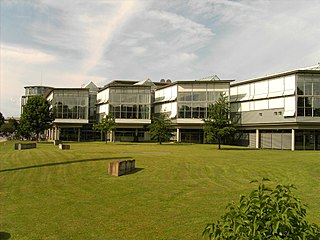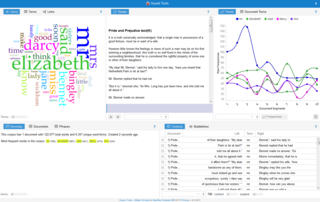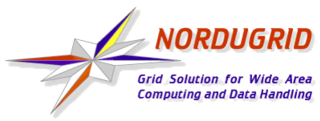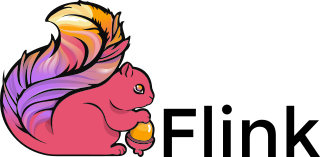Grid computing is the use of widely distributed computer resources to reach a common goal. A computing grid can be thought of as a distributed system with non-interactive workloads that involve many files. Grid computing is distinguished from conventional high-performance computing systems such as cluster computing in that grid computers have each node set to perform a different task/application. Grid computers also tend to be more heterogeneous and geographically dispersed than cluster computers. Although a single grid can be dedicated to a particular application, commonly a grid is used for a variety of purposes. Grids are often constructed with general-purpose grid middleware software libraries. Grid sizes can be quite large.
The Perseus Digital Library, formerly known as the Perseus Project, is a free-access digital library founded by Gregory Crane in 1987 and hosted by the Department of Classical Studies of Tufts University. One of the pioneers of digital libraries, its self-proclaimed mission is to make the full record of humanity available to everyone. While originally focused on the ancient Greco-Roman world, it has since diversified and offers materials in Arabic, Germanic, English Renaissance literature, 19th century American documents and Italian poetry in Latin, and has sprouted several child projects and international cooperation. The current version, Perseus 4.0, is also known as the Perseus Hopper, and is mirrored by the University of Chicago.
Software development is the process used to create software. Programming and maintaining the source code is the central step of this process, but it also includes conceiving the project, evaluating its feasibility, analyzing the business requirements, software design, testing, to release. Software engineering, in addition to development, also includes project management, employee management, and other overhead functions. Software development may be sequential, in which each step is complete before the next begins, but iterative development methods where multiple steps can be executed at once and earlier steps can be revisited have also been devised to improve flexibility, efficiency, and scheduling.
Web development is the work involved in developing a website for the Internet or an intranet. Web development can range from developing a simple single static page of plain text to complex web applications, electronic businesses, and social network services. A more comprehensive list of tasks to which Web development commonly refers, may include Web engineering, Web design, Web content development, client liaison, client-side/server-side scripting, Web server and network security configuration, and e-commerce development.
A collaboratory, as defined by William Wulf in 1989, is a “center without walls, in which the nation’s researchers can perform their research without regard to physical location, interacting with colleagues, accessing instrumentation, sharing data and computational resources, [and] accessing information in digital libraries”.

The Göttingen State and University Library is the library for Göttingen University as well as for the Göttingen Academy of Sciences and is the state library for the German State of Lower Saxony. One of the largest German academic libraries, it has numerous national as well as international projects in librarianship and in the provision of research infrastructure services. In the year 2002, the SUB Göttingen won the German Library of the Year award. Its current director is Wolfram Horstmann.

Digital humanities (DH) is an area of scholarly activity at the intersection of computing or digital technologies and the disciplines of the humanities. It includes the systematic use of digital resources in the humanities, as well as the analysis of their application. DH can be defined as new ways of doing scholarship that involve collaborative, transdisciplinary, and computationally engaged research, teaching, and publishing. It brings digital tools and methods to the study of the humanities with the recognition that the printed word is no longer the main medium for knowledge production and distribution.

NorduGrid is a collaboration aiming at development, maintenance and support of the free Grid middleware, known as the Advanced Resource Connector (ARC).
The D-Grid Initiative was a government project to fund computer infrastructure for education and research (e-Science) in Germany. It uses the term grid computing. D-Grid started September 1, 2005 with six community projects and an integration project (DGI) as well as several partner projects.
A virtual observatory (VO) is a collection of interoperating data archives and software tools which utilize the internet to form a scientific research environment in which astronomical research programs can be conducted.
ATLAS.ti is a computer-assisted qualitative data analysis software that facilitates analysis of qualitative data for qualitative research, quantitative research, and mixed methods research.
The Barrow Area Information Database (BAID) is designed to support Arctic science with a special focus on the research hubs of Barrow, Atqasuk, and Ivotuk on the North Slope of Alaska.

Open Cobalt is a free and open-source software platform for constructing, accessing, and sharing virtual worlds both on local area networks or across the Internet, with no need for centralized servers.

David Charles De Roure is an English computer scientist who is a professor of e-Research at the University of Oxford, where he is responsible for Digital Humanities in The Oxford Research Centre in the Humanities (TORCH), and is a Turing Fellow at The Alan Turing Institute. He is a supernumerary Fellow of Wolfson College, Oxford, and Oxford Martin School Senior Alumni Fellow.

Citavi is a reference management and knowledge organization program for Microsoft Windows published by Swiss Academic Software in Wädenswil, Switzerland. Citavi is widely used in Germany, Austria, and Switzerland, with site licenses at most universities, many of which offer training sessions and settings files for Citavi.
The Maryland Institute for Technology in the Humanities (MITH) is an international research center that works with humanities in the 21st century. A collaboration among the University of Maryland College of Arts and Humanities, Libraries, and Office of Information Technology, MITH cultivates research agendas clustered around digital tools, text mining and visualization, and the creation and preservation of electronic literature, digital games and virtual worlds.

Apache Flink is an open-source, unified stream-processing and batch-processing framework developed by the Apache Software Foundation. The core of Apache Flink is a distributed streaming data-flow engine written in Java and Scala. Flink executes arbitrary dataflow programs in a data-parallel and pipelined manner. Flink's pipelined runtime system enables the execution of bulk/batch and stream processing programs. Furthermore, Flink's runtime supports the execution of iterative algorithms natively.
The project Text Database and Dictionary of Classic Mayan promotes research on the writing and language of pre-Hispanic Maya culture. It is housed in the Faculty of Arts at the University of Bonn and was established with funding from the North Rhine-Westphalian Academy of Sciences, Humanities and the Arts. The project has a projected run-time of fifteen years and is directed by Nikolai Grube from the Department of Anthropology of the Americas at the University of Bonn. The goal of the project is to conduct computer-based studies of all extant Maya hieroglyphic texts from an epigraphic and cultural-historical standpoint, and to produce and publish a database and a comprehensive dictionary of the Classic Mayan language.
Science gateways provide access to advanced resources for science and engineering researchers, educators, and students. Through streamlined, online, user-friendly interfaces, gateways combine a variety of cyberinfrastructure (CI) components in support of a community-specific set of tools, applications, and data collections.: In general, these specialized, shared resources are integrated as a Web portal, mobile app, or a suite of applications. Through science gateways, broad communities of researchers can access diverse resources which can save both time and money for themselves and their institutions. As listed below, functions and resources offered by science gateways include shared equipment and instruments, computational services, advanced software applications, collaboration capabilities, data repositories, and networks.
Civil clause, sometimes civilian clause or civilians' clause, is a voluntary commitment by academic institutions to engage exclusively in civil research.








